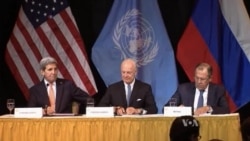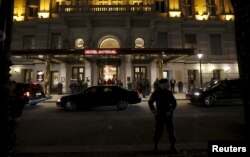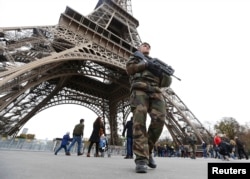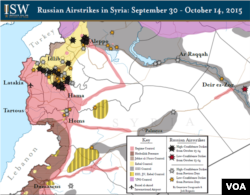Foreign ministers and other officials attending talks on Syria’s political future say Friday’s deadly attacks in Paris have underscored the need to try to resolve Syria’s crisis.
Representatives for world powers including the U.S., Russia, Iran and the United Nations wrapped up their second round of talks in Vienna on Saturday with a broad plan for a political transition in Syria as well as a process that should lead to an agreement on terrorist groups in the country.
Speaking in French, U.S. Secretary of State John Kerry said, “We stand with France and the rest of the world in our resolve to eliminate the scourge of terrorism from the face of the Earth.”
He commented at a news conference with Russian Foreign Minister Sergey Lavrov and U.N. Syrian envoy Staffan de Mistura.
The 20 world powers at the talks agreed on the need to bring Syrian government and opposition representatives into U.N.-mediated talks by January 1.
They also voiced support for the establishment of credible, inclusive governance in Syria within six months and free and fair elections within 18 months.
Kerry said under the plan, a cease-fire would be enacted as soon as Syrian government and opposition representatives took initial steps toward the U.N.-supervised transition. However, that cease-fire would not include the Islamic State or al-Qaida-linked Jabhat al-Nusra groups.
There has been strong disagreement about which elements of the Syrian opposition constitute the moderates and which elements are terrorists. The participants agreed that Jordan would coordinate a common list of terrorist groups in Syria that would be presented to the U.N. Security Council.
Unless world powers can offer the Syrian people some kind of incentive, it is unclear how the plan would work, said Anthony Cordesman, a security and defense scholar at the Center for Strategic and International Studies in Washington.
“Unless you have some way of reaching out to Syrians and saying, ‘Here is some kind of international alternative that could rebuild the country, provide aid, help refugees come back,’ ” then there may be no progress, he said.
US, Russia still at odds
In spite of progress on a political transition for Syria, sharp differences remain between the U.S. and Russia on the status of Syrian President Bashar al-Assad.
“The Syrian future will be decided by the Syrian people overall,” said Lavrov. “And this regards also the destiny of Mr. Assad.”
Russia and Iran have backed the Assad regime, but the U.S. and its allies do not believe Assad should be part of a long-term resolution to Syria’s political crisis.
Kerry and Lavrov also disagreed on the relationship between Assad and Islamic State.
Kerry said Assad “cut his own deal” with Islamic State by buying oil from the terrorist group. He also said the Assad regime had not attacked IS positions in Syria.
Moments later, Lavrov said he could not agree with the logic that “Assad is the cause for everything.”
The International Syria Support Group said it expected to meet again in about a month to review progress.
The State Department said Kerry would meet briefly with Iranian Foreign Minister Mohammed Javad Zarif, on Saturday. Kerry then travels to Turkey, where he will join President Barack Obama for the G-20 Leaders summit.
Kerry traveled to Vienna from Tunisia, where the two countries held their second strategic dialogue.








